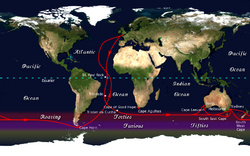Earth:Great capes
In sailing, the great capes are three major capes of the continents in the Southern Ocean—Africa's Cape of Good Hope, Australia's Cape Leeuwin, and South America's Cape Horn.[1]
Sailing
The traditional clipper route followed the winds of the roaring forties south of the great capes. Due to the significant hazards they presented to shipping, the great capes became significant landmarks in ocean voyaging.[2] The great capes became common points of reference, though other nearby capes may have been more southern or shared in notability.
Today, the great capes feature prominently in ocean yacht racing, with many races and individual sailors following the clipper route. A circumnavigation via the great capes is considered to be a noteworthy achievement.[3] Sailor Joshua Slocum completed the first solo circumnavigation of the world in 1895–1898, and the Joshua Slocum Society International presented its Level 3 Golden Circle Award to sailors who solo circumnavigated passing the great capes.[3] Kirsten Neuschäfer of South Africa , age 39, became the first female sailor to complete this circumnavigation in the Golden Globe Race of 2022, finishing on April 27, 2023, her official time reported as 233 days, 20 hours, 43 minutes and 47 seconds at sea.[4][5][6]
In his book The Long Way, Bernard Moitessier tries to express the significance to a sailor of the great capes:
A sailor's geography is not always that of the cartographer, for whom a cape is a cape, with a latitude and longitude. For the sailor, a great cape is both a very simple and an extremely complicated whole of rocks, currents, breaking seas and huge waves, fair winds and gales, joys and fears, fatigue, dreams, painful hands, empty stomachs, wonderful moments, and suffering at times. A great cape, for us, can't be expressed in longitude and latitude alone. A great cape has a soul, with very soft, very violent shadows and colours. A soul as smooth as a child's, as hard as a criminal's. And that is why we go.[7]
Five southernmost capes
Other southern capes mark significant points of passage through the southern oceans. The five southernmost capes refer to the five geographically southern mainland (or large island) points on the Earth.[3]
Sailors circumnavigating the world have used these five southernmost capes as goals on their route.
| Cape | Location | Coordinates | Notes |
|---|---|---|---|
| Cape Horn | Chile | [ ⚑ ] 55°58′45″S 067°16′30″W / 55.97917°S 67.275°W | Hornos Island; Southernmost point in the Tierra del Fuego islands of South America and the official dividing point between the Atlantic and Pacific oceans. Roughly 2 degrees of latitude farther south than Chile's Cape Froward, the southernmost point on the mainland of South America, in the Magellan Strait. |
| Cape Agulhas | South Africa | [ ⚑ ] 34°50′00″S 20°00′00″E / 34.8333333°S 20°E | From Portuguese Cabo das Agulhas, for "Cape of Needles"; Southernmost point of Africa and the official dividing point between the Atlantic and Indian oceans. Roughly 29 minutes of latitude farther south than the more commonly cited Cape of Good Hope. |
| West Cape Howe | Australia | [ ⚑ ] 35°8′0″S 117°38′15″E / 35.133333°S 117.6375°E | Contains three "heads", with the easternmost Torbay Head being the southernmost point of the mainland of Western Australia. Roughly 46 minutes of latitude farther south than the more commonly cited Cape Leeuwin. |
| South East Cape | Australia | [ ⚑ ] 43°38′30″S 146°49′45″E / 43.64167°S 146.82917°E | Southernmost point of the main island of Tasmania and the official dividing point between the Pacific and Indian oceans. Roughly 4° 30′ farther south than South Point on the Wilsons Promontory peninsula in Victoria. South Point, Victoria is the most southern mainland point of Australia, on the north side of the Bass Strait separating Tasmania from the southeast Australian mainland |
| South Cape / Whiore | New Zealand | [ ⚑ ] 47°17′15″S 167°32′15″E / 47.2875°S 167.5375°E | Southernmost point of Stewart Island / Rakiura and the southernmost point of the main islands of New Zealand. Roughly 37 minutes of latitude farther south than Slope Point, the southernmost point of the South Island. |
References
- ↑ The Circumnavigators , by Don Holm; Around the Three Capes. Prentice-Hall, NY, 1974. ISBN:0-13-134452-8 Retrieved February 5, 2006.
- ↑ Along the Clipper Way, Francis Chichester; page 78. Hodder & Stoughton, 1966. ISBN:0-340-00191-7
- ↑ 3.0 3.1 3.2 Slocum Awards: Golden Circle Award, from the Joshua Slocum Society International. Retrieved February 13, 2006.
- ↑ Schlachter, Thomas (2023-04-28). "'A legend is born': Kirsten Neuschäfer becomes first woman to win historic Golden Globe Race" (in en). https://www.cnn.com/2023/04/28/sport/kirsten-neuschfer-women-golden-globe-race-spt-intl/index.html.
- ↑ https://www.yachtingmonthly.com/boat-events/golden-globe-race/kirsten-neuschafer-wins-2022-golden-globe-race-and-makes-history-93838
- ↑ "She went around the world in 235 days to win sailing's most grueling competition". https://www.npr.org/2023/04/27/1172412057/golden-globe-sailing-race-kirsten-neuschafer-around-the-world.
- ↑ The Long Way, by Bernard Moitessier; page 141. Sheridan House, 1995. ISBN:0-924486-84-8
External links
- Solo Circumnavigation of the Earth
- Dodge D Morgan's Solo Circumnavigation
- Via the Great Southern Capes[|permanent dead link|dead link}}]
- Kay Cottee - Australian Sporting Heroes
 |


